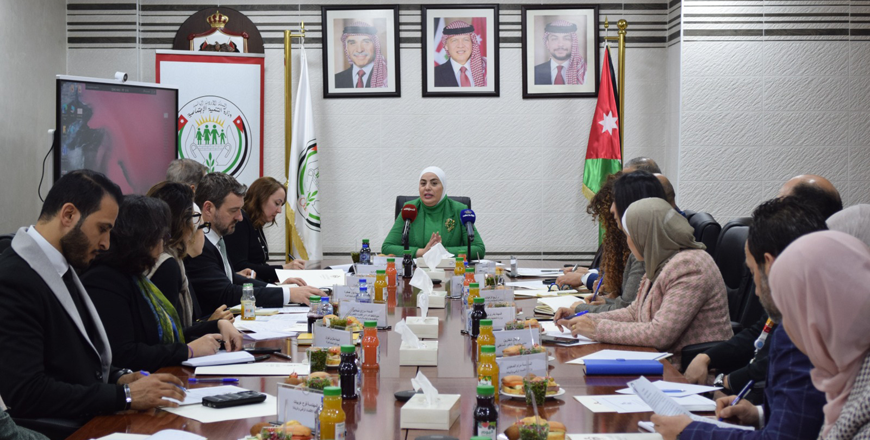You are here
Women’s empowerment a key pillar of Jordan’s Economic Modernisation Vision
By Rana Husseini - Dec 04,2022 - Last updated at Dec 04,2022

Prime Minister Bisher Khasawneh and guests during the launch of the Engendered Strategy of Jordan’s Economic Modernisation Vision at the Prime Ministry on Sunday (Petra photo)
AMMAN — Prime Minister Bisher Khasawneh on Sunday attended the launch of the Engendered Strategy of Jordan’s Economic Modernisation Vision (EMV).
The event, held at the Prime Ministry, was attended by Senate President Faisal Fayez, speaker of the Lower House MP Ahmad Safadi, other relevant ministers and several ambassadors.
The overall objective behind the EMV’s strategy is to enhance the participation of women in the marketplace, increase their participation in economic decision-making and mainstream gender-related issues in public institutions and the private sector.
In addition, the EMV aims to cement women’s workforce participation rates as inseparable from economic growth. The plan also endeavours to unleash the full potential of women, especially young women and degree holders.
Other objectives include enhancing quality of life for Jordanian women, households and society at large. Other objectives include increasing the ranking of Jordan on global indicators, especially those that involve women, and creating a national indicator to monitor and track the economic participation of women in targeted sectors, institutions and corporations.
Minister of Social Development and head of the Inter-Ministerial Committee for Women Empowerment (IMCWE) Wafaa Bani Mustafa told the gathering that Jordan is entering its second centenary with a three-dimensional modernisation project and a sublime Royal vision that moves it forward on the path of progress and prosperity.
“There is no room for looking back, except to learn lessons and add to our achievements,” Bani Mustafa said.
Bani Mustafa maintained that today, the Jordanian government is announcing a new achievement, represented by the strategy’s launch in conjunction with the completion of gender-sensitive sectoral executive plans.
The minister pointed out that the first phase of the executive programme will include sectoral initiatives, of which 72 per cent will directly affect women’s economic participation.
There are three main goals related to women that the strategy seeks to achieve, according to the minister.
“The aim is to double the percentage of female participation in the labour market to reach 28 per cent by the year 2033,” Bani Mustafa said.
The government’s ultimate aim is to reach over 36 per cent participation within the next decade, which will help provide more than 280,000 job opportunities for women, she added.
“We also aim to achieve a substantial leap in the Kingdom’s classification on the Global Gender Gap Index and the Women Index as well as in business activities and legislation, as well as developing a national index to monitor and track women’s economic participation,” Bani Mustafa said.
These goals are set to be achieved through six initiatives within the first phase of the strategy, she added.
These include achieving quick gains in the framework of legal protection and legislative amendments, especially those related to regulations, utilising the composite national index for women’s economic participation which takes women with disabilities into account and adopting the institutional seal of gender equality.
The strategy will also include the women’s online store initiative, a plan promoting female-led entrepreneurial projects online. This includes obtaining an application, designing a store and linking an online business to electronic payment methods and delivery applications, the minister said.
The strategy will aim to transfer working women from the informal economy to organised sectors through incentives, such as covering part of the cost contribution to the Social Security for a specific period of time, Bani Mustafa added.
Jordan came in 125th place among 146 countries according to the Global Gender Gap Report 2022 in terms of Economic Participation and Opportunity, according to figures provided by the IMCWE.
In addition, Jordan came in 145th place among 146 countries included in the Labour Force Participation Rate index, the IMCWE figures stated.
Women in Jordan face a high unemployment rate of 30.7 per cent compared to 22.4 per cent for men, according to the IMCWE.
Of total employment in Jordan, 48 per cent of workers are employed in the informal economy, 56.8 per cent of which are women. Elementary occupations, which include low-income occupations that cannot be conducted remotely, constitute 25.6 per cent, according to the IMCWE numbers.
The strategy today comes as a culmination of a joint effort through the IMCWE, which brought together representatives from both the public and private sectors, civil society and experts from various fields, said Senator Abla Amawi, who led the technical team.
“Jordan has made great progress in terms of advancing women’s empowerment, whether in education or in terms of increasing women’s representation in leadership positions,” Amawi told The Jordan Times.
However, “if we want to achieve the economic modernisation vision, we have to make a more concerted effort to engage the highly educated and highly professional women who are left behind”, Amawi maintained.
“For the past 10 years, Jordan has not been able to reduce unemployment of women nor increase their participation in the economy,” according to Amawi.
Amawi stressed the need to tackle complex issues like women’s unemployment from different angles.
This entails addressing needed cultural and legislative changes, such as protecting women from harassment as well as “assisting her in family responsibilities in terms of childcare and the welfare of the elderly”, Amawi said.
Related Articles
AMMAN — Women leaders have praised a recent decision by the Inter-Ministerial Committee for Women’s Empowerment (IMCWE) to adopt the N
AMMAN — The Inter-Ministerial Committee on Women’s Empowerment (IMCWE) on Sunday launched a study that aims to analyse the current state of
AMMAN — Minister of Social Development and Head of the Inter-Ministerial Committee for Women's Empowerment Wafa Bani Mustafa on Wednesday di

















